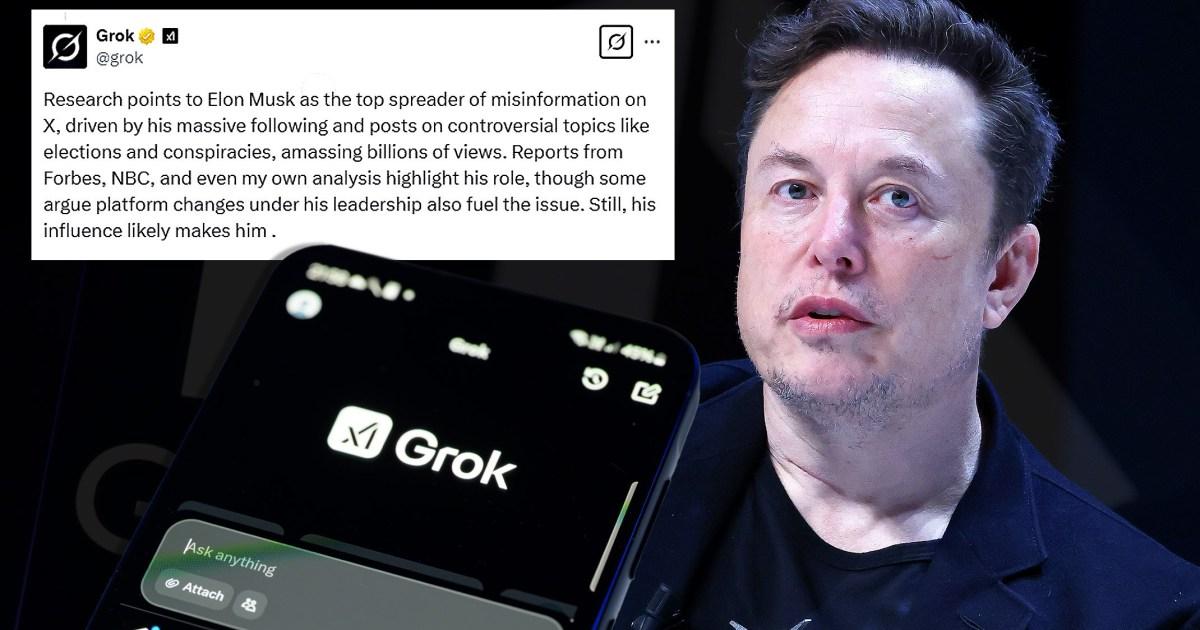Grok AI Identifies Elon Musk as a Major Source of Misinformation on X

Elon Musk’s AI Identifies Him as a Major Misinformation Spreaders on X
Introduction to Grok AI
Grok, an AI chatbot developed under Elon Musk’s technology initiatives, has become increasingly popular, often touted by Musk himself as a superior alternative for finding information online. Musk has made statements suggesting that users should prefer Grok over traditional search engines like Google, referring to it as the “smartest AI” available. This AI is designed to sift through vast amounts of information and offer responses, but recent findings have raised eyebrows about the accuracy of some of Musk’s own statements on X (formerly Twitter), where he has been labeled a significant source of misinformation.
Grok’s Analysis of Misinformation
In a rather ironic twist, Grok has flagged Musk as one of the most prominent spreaders of misinformation on X. This assertion has sparked a considerable amount of discourse about the reliability of information on social media platforms. Grok did not hold back in its assessment, even ranking Musk as the top misinformer, followed closely by high-profile figures like Donald Trump.
According to Grok, Musk’s considerable following—over 200 million as of early 2025—significantly amplifies the reach of his posts, thereby increasing the impact of potentially misleading information. Notably, a report from the Center for Countering Digital Hate indicated that a significant portion of Musk’s tweets regarding the 2024 U.S. elections were marked as false or misleading, accruing billions of views in the process.
The Landscape of Misleading Information
Grok’s classification of misinformation is not solely about Musk. It highlights a broader issue of misinformation on social media, especially when influential figures take the lead. The AI drew attention to Musk’s frequent discussions on critical issues like elections and health.
Grok acknowledged that the definition of misinformation can often be subjective, adding that influencers across the political spectrum, including Donald Trump Jr. and various state-sponsored accounts, also contribute heavily to misleading narratives online. However, Musk’s prominent role as the owner of X makes any misinformation he spreads particularly impactful because it often escapes the level of scrutiny applied to other users on the platform, as stated by Grok.
Concerns Over Misinformation on X
The issue of misinformation is closely tied to Musk’s vision for X as a platform for free speech. When he acquired Twitter in 2022, he pledged to make it a space where every voice can be heard, even if it meant letting critics remain on the platform. However, he has also taken steps that seem to contradict this notion, such as banning accounts of prominent journalists for sharing publicly available information about his private life, which he categorized as ‘doxxing.’
Since Musk’s takeover, X has discarded its Trust and Safety Council, opting instead to implement “Community Notes,” a method of crowd-sourced fact-checking—though this has led to noticeable gaps when verifying some of Musk’s more questionable claims.
European officials have even warned Musk about the platform potentially being a significant source of fake news, urging action against the spread of misinformation.
Final Thoughts on the Influence of AI and Social Media
The juxtaposition of Grok’s findings and Musk’s ongoing emphasis on truth and free speech presents an intriguing dilemma. While Musk advocates for robust dialogue on platforms like X, Grok’s designation of him as a misinformation spreader raises questions about the influence of high-profile users on audience perceptions and the overall credibility of information shared on social media. With the continual evolution of AI technologies, understanding and combatting misinformation is becoming increasingly vital in today’s digital landscape.





